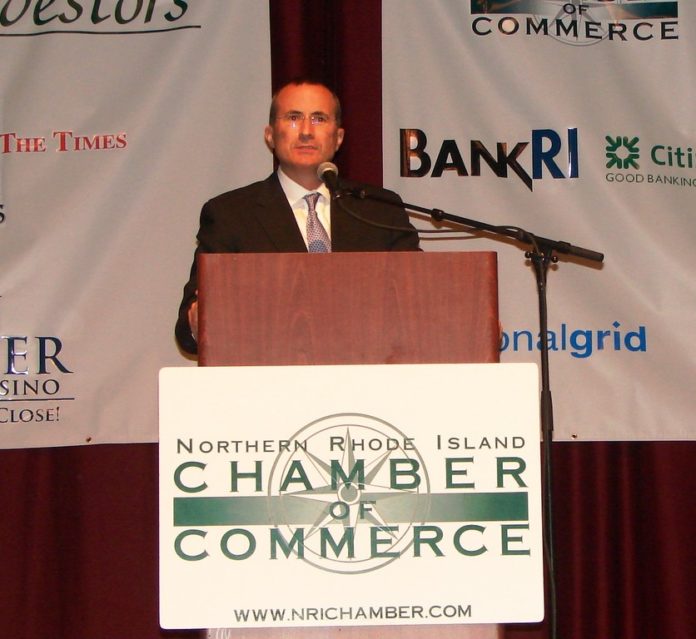
LINCOLN – The Northern Rhode Island Chamber of Commerce’s 22nd annual dinner, held Tuesday evening at Twin River, attracted 370 to see a number of their membership feted and hear a speech by an officer of the U.S. Chamber of Commerce that played up the role of manufacturing in supporting the United States’ claim to the pre-eminent economic position in the world.
David C. Chavern, executive vice president and chief operation officer of the U.S. Chamber, began his presentation by countering what he sees as the perceived wisdom in the U.S. that “we don’t make anything in this country anymore.”
His response: “This is all flat, dead wrong.”
He backed up that assertion with these numbers: $1.7 trillion in value generated by the manufacturing sector per year, 12 percent of GDP; 12 million Americans working directly in manufacturing. In total, thanks to direct employment and a multiplier effect, the manufacturing sector supports 17 million U.S. jobs (he did not have numbers for Rhode Island).
He went on to note that these numbers were growing, not falling, as between 1993 and 2011, the value of U.S. manufacturing output grew 73 percent. And in 2011, U.S. manufacturing output increased 4 percent, twice the rate of the overall U.S. economy. And lastly, he said the U.S. accounted for 21 percent of world manufacturing value added in 2010, more than China, India, Brazil and Russia combined, as the U.S. remains the world’s largest manufacturer.
Chavern also countered the argument that “off-shoring” has cost the U.S. manufacturing jobs, which fell to 11.4 million from its peak of 19.5 million in 1979. “Where did those jobs go?” he asked. “Mostly to a country called ‘productivity’.”
Still, he believes that the nation must be clear sighted in the challenge that lies ahead, one which demands changes in how the country supports industry.
Driving what Chavern believes must be a re-invigorated U.S. economic policy are three “P”s – people, perspective and policies.
People stands for the need improve the education and training of potential workers in what he called “mechatronics,” a combination of mechanical, electronic, computer, system design and software engineering. “Without qualified workers in these jobs, manufacturers can’t expand operations or improve productivity,” he said.
The perspective Chavern believes the nation must take is global, as in “the administration and Congress should embrace the idea that the U.S. should be the very best place in the world to do business – and they must advance policies that will make it reality.” He pointed to the fact that even France and China have comprehensive national strategies for aligning the needs of business and government, something that does not exist in the United States.
His final point of emphasis – policies – used a National Association of Manufacturers estimate that “U.S. policies related to taxes, regulations, health care, the tort system and energy drive manufacturing costs up 20 percent.” In addition, he referenced a study commissioned by the Manufacturers Alliance for Productivity and Innovation that found that in the next decade, regulations will drag down economic output by 6 percent.
He called for more free trade agreements, pointing to the fact that over the last three years the U.S. has a $100 billion trade surplus in manufactured goods with free trade agreement partners, while it has a trillion dollar deficit in manufactured goods with all others.
Positive trends already underway including the drop in energy costs domestically, which will help manufactures bring down their cost structures, while creating new jobs themselves. Chavern pointed to other built-in advantages the U.S. has over economic competitors – natural resources (including energy and water), demographics and a history of entrepreneurship.
“The question is, are we willing to tear down the hurdles of our own making?” he said. “Are we willing to tackle the policies that hold us back and drag us down? Fundamentally – are we willing to get out of our own way?”
Prior to Chavern’s speech, the Chamber made its two annual awards presentations. Receiving the Barbara C. Burlingame Distinguished Public Service Award, which recognizes a Rhode Island elected official who has made outstanding contributions to the business community, was R.I. Sen. Roger Picard. And taking the Ben G. Mondor Award was Bob Andrade, executive vice president and chief operating officer of Pawtucket Credit Union.










